牛津译林版八年级上册 Unit 5 Wild animals 第4课时 课件 (共26张PPT)
文档属性
| 名称 | 牛津译林版八年级上册 Unit 5 Wild animals 第4课时 课件 (共26张PPT) | 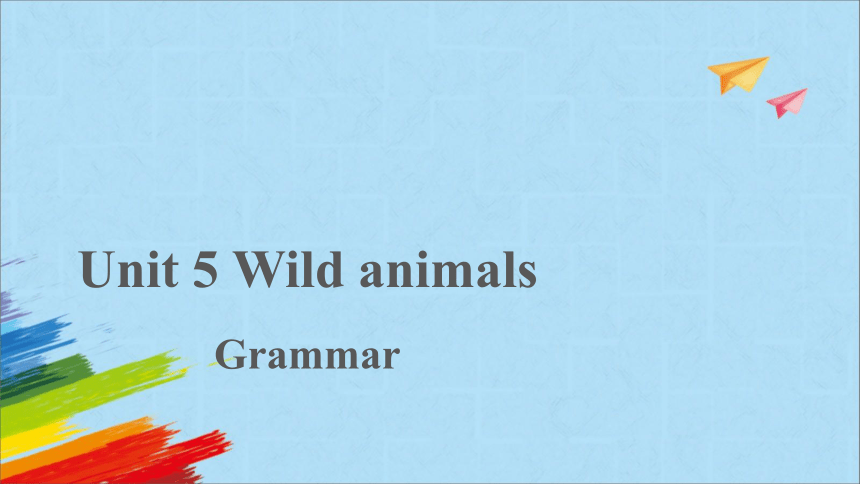 | |
| 格式 | pptx | ||
| 文件大小 | 3.4MB | ||
| 资源类型 | 教案 | ||
| 版本资源 | 牛津译林版 | ||
| 科目 | 英语 | ||
| 更新时间 | 2022-10-22 22:29:03 | ||
图片预览

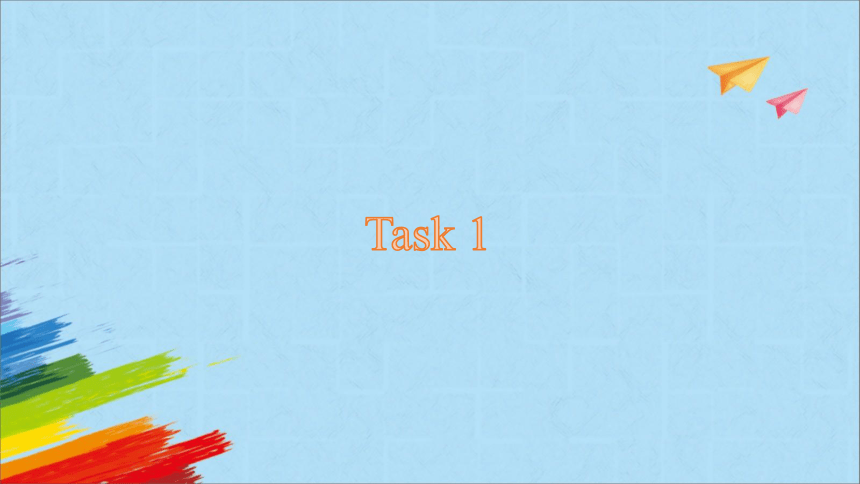
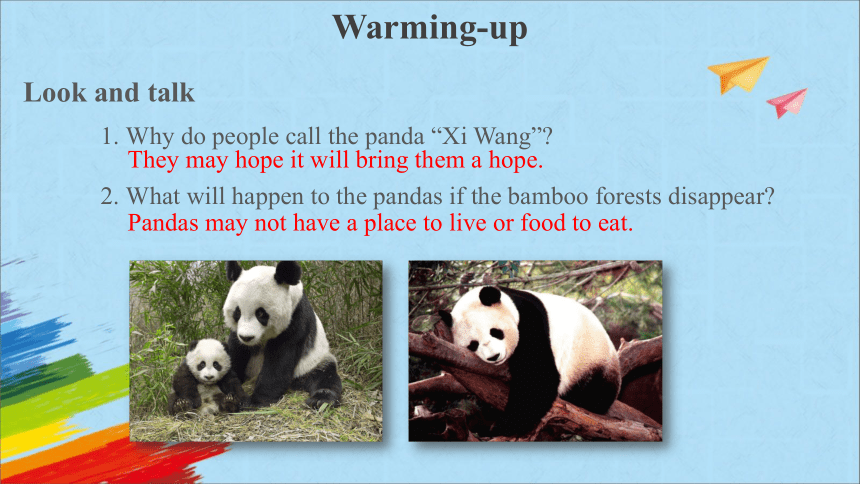
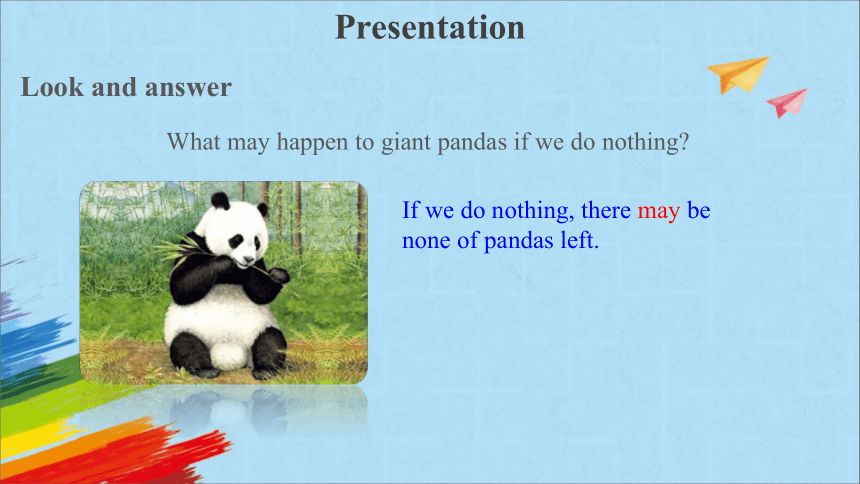
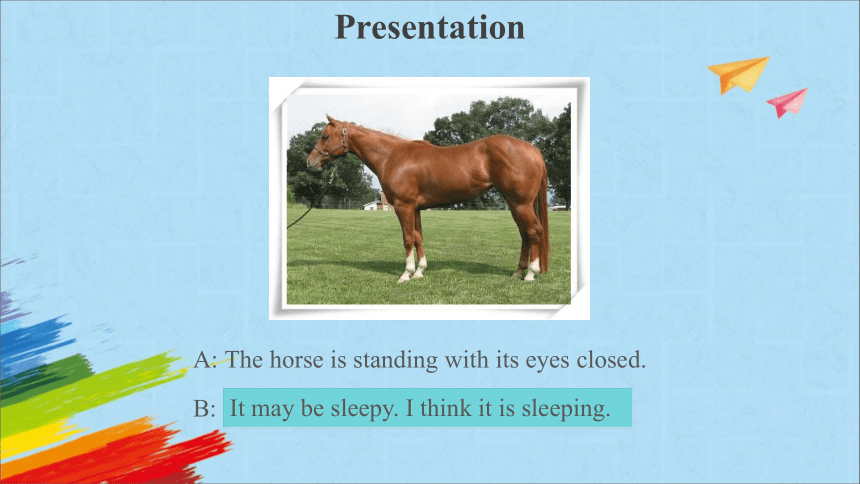

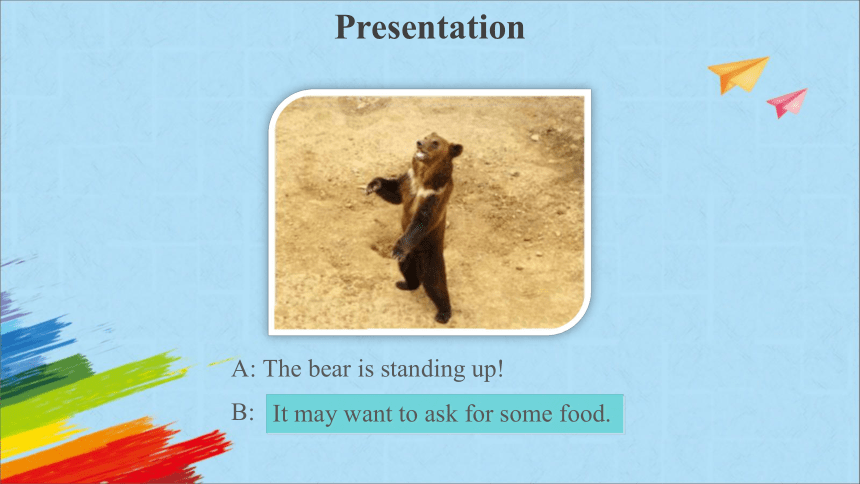
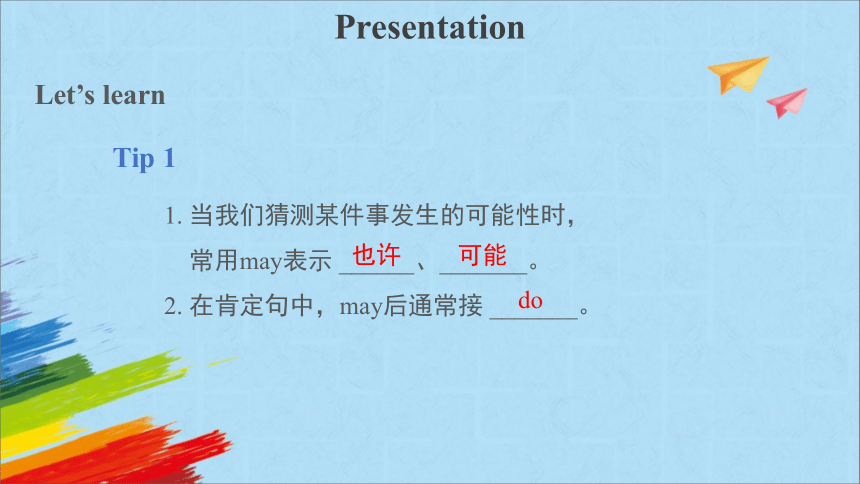
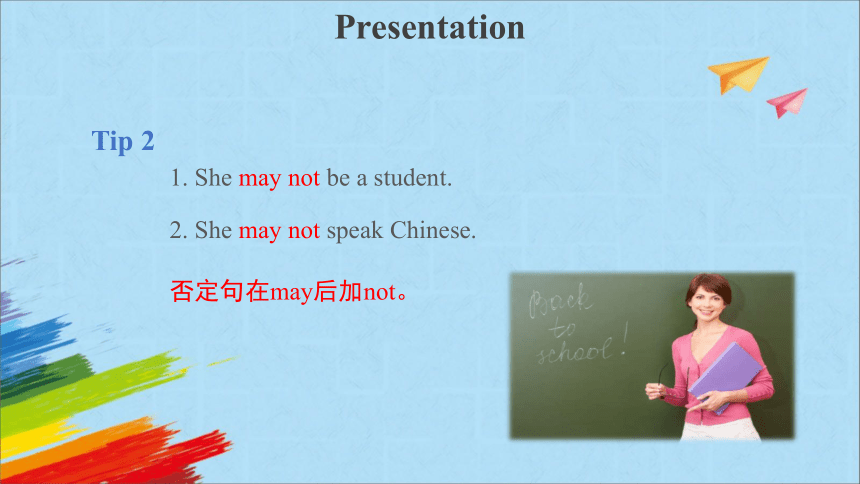
文档简介
(共26张PPT)
Unit 5 Wild animals
Grammar
Task 1
1. Why do people call the panda “Xi Wang”
2. What will happen to the pandas if the bamboo forests disappear
Warming-up
Look and talk
They may hope it will bring them a hope.
Pandas may not have a place to live or food to eat.
What may happen to giant pandas if we do nothing
Presentation
Look and answer
If we do nothing, there may be none of pandas left.
A: The horse is standing with its eyes closed.
It may be sleepy. I think it is sleeping.
B:
Presentation
A: The monkey looks so sad in the cage.
It may want to play outside.
B:
Presentation
A: The bear is standing up!
It may want to ask for some food.
B:
Presentation
1. 当我们猜测某件事发生的可能性时,
常用may表示 ______、_______。
2. 在肯定句中,may后通常接 _______。
Tip 1
也许
可能
do
Presentation
Let’s learn
1. She may not be a student.
2. She may not speak Chinese.
否定句在may后加not。
Tip 2
Presentation
Millie is in the zoo. She is telling Sandy on the phone about what plete what Millie says using may with the words in brackets.
1. The elephant is going towards the water.
It ___________ (need) a bath.
2. The little boy is crying because he saw the tigers.
He ________ (be) afraid of them.
may need
may be
Practice
3. I cannot go near the lions and tigers.
They __________ (hurt) me.
4. The baby panda is not drinking its mum’s milk.
It _____________ (not be) hungry.
5. The monkeys are jumping around.
They _______________ (be playing) with each other.
6. The horse is standing with its eyes closed.
It ______________ (be sleeping).
may hurt
may not be
may be playing
may be sleeping
Practice
Introduce the animals using may.
A: The baby panda is waving to us.
B: It … (be saying) hello to us.
A: The pandas are going towards the water.
B: They … (be) thirsty.
A: The monkeys are jumping around.
B: They … (be playing) with each other.
Production
Task 2
What do you plan to do this weekend
Presentation
Look and talk
The person I plan to go there with.
The things I want to take with.
The way I decide to get there.
The activities I hope to do there.
The time I want to stay there.
Presentation
Introduce your plans
I plan to go to the zoo with my family.
I want to take a camera and some food.
I decide to go there by bus.
I hope to take some photos of animals.
I want to stay there for about three hours.
Talk about the plan
A: Who does … plan to go out with
B: He/She (plan/go out with his family).
A: What does he want to take
B: He/She (want/take a camera and some food).
A: How does he decide to get there
B: He/She (decide/get there by bus).
A: What does he hope to do there
B: He/She (hope/take some photos of animals).
A: How long does he want to stay there
B: He/She (want/stay there for about three hours).
Presentation
agree to do sth.
begin to do sth.
decide to do sth.
fail to do sth.
forget to do sth.
hope to do sth.
to + do叫做动词不定式
learn to do sth.
plan to do sth.
prepare to do sth.
remember to do sth.
try to do sth.
want to do.
Presentation
Let’s learn
remember __________ sth. 记得要做某事
remember __________ sth. 记得做过某事
forget _________ sth. 忘记要做某事
forget _________ sth. 忘记做过某事
(forgot)
to do
doing
to do
doing
Presentation
e.g.
Tom,记得课后和我们一起打篮球。
Tom, ________ ________ play basketball with us after class.
我记得上个月写了一封信给你。
I _________ __________ a letter to you last month.
remember to
remember writing
Presentation
Try to find “verb+to-infinitives” in the passage.
Last month, Nick visited Uncle Wang in the country with
his parents. At first, his father planned to drive his car there.
However, the traffic was so busy that they decided to take a
bus there. Uncle Wang has a big farm, and there are many
apple trees in it. Nick couldn’t wait to get there to help Uncle
Wang pick apples.
In the farm he tried to pick the apples in a tall tree, but he
wasn’t tall enough and failed to reach one. Two hours later,
he felt thirsty and stopped to choose a big and red apple.
He was just beginning to eat it when his mother said to him,
“Remember to wash it before eating. You should learn to form
a good habit of cleaning fruits before eating them.”
Practice
1. They are preparing _______ (have) a sports meeting.
2. Jim agreed ______ (go) to the West Lake.
3. It’s easy _________ (play) softball.
4. What made you ______ (feel) sad
5. Mr White learned ________ (ride) a horse last year
6. We will try our best ________ (read) more books.
to have
to go
to play
feel
to ride
Fill in the blanks
to read
Practice
Dad: Do you know anything special about wild animals
Amy: Yes, Dad. For example, dolphins are clever. They
can _________________ (learn, work out) easy maths problems.
Dad: What do you know about bats
Amy: Bats can’t see, but they can ____________ (decide, fly) the right
way with the help of their mouth and ears.
Dad: Did you know that bees never get lost
Amy: Yes. Bees always_________________________
(remember, come back) the same way as they went.
Dad: What do you know about squirrels
Amy: They always ______________ (begin, save) some food before
winter comes.
Dad: Yes, but sometimes they forget where to find the food.
learn to work out
decide to fly
remember to come back
begin to save
Complete the conversation
Practice
Talk about the animals with may and to do
Production
Do you know anything special about wild animals
1. If we do nothing, soon there may be none left.
2. At four months old, she started to go outside for the first time.
3. When she was six months old, she began to eat bamboo.
4. When she was 20 months old, she learnt to look after herself.
Summary
1. Make more sentences with may and verbs + to-infinitives.
2. Finish the exercises in the workbook.
Homework
Thank you!
Unit 5 Wild animals
Grammar
Task 1
1. Why do people call the panda “Xi Wang”
2. What will happen to the pandas if the bamboo forests disappear
Warming-up
Look and talk
They may hope it will bring them a hope.
Pandas may not have a place to live or food to eat.
What may happen to giant pandas if we do nothing
Presentation
Look and answer
If we do nothing, there may be none of pandas left.
A: The horse is standing with its eyes closed.
It may be sleepy. I think it is sleeping.
B:
Presentation
A: The monkey looks so sad in the cage.
It may want to play outside.
B:
Presentation
A: The bear is standing up!
It may want to ask for some food.
B:
Presentation
1. 当我们猜测某件事发生的可能性时,
常用may表示 ______、_______。
2. 在肯定句中,may后通常接 _______。
Tip 1
也许
可能
do
Presentation
Let’s learn
1. She may not be a student.
2. She may not speak Chinese.
否定句在may后加not。
Tip 2
Presentation
Millie is in the zoo. She is telling Sandy on the phone about what plete what Millie says using may with the words in brackets.
1. The elephant is going towards the water.
It ___________ (need) a bath.
2. The little boy is crying because he saw the tigers.
He ________ (be) afraid of them.
may need
may be
Practice
3. I cannot go near the lions and tigers.
They __________ (hurt) me.
4. The baby panda is not drinking its mum’s milk.
It _____________ (not be) hungry.
5. The monkeys are jumping around.
They _______________ (be playing) with each other.
6. The horse is standing with its eyes closed.
It ______________ (be sleeping).
may hurt
may not be
may be playing
may be sleeping
Practice
Introduce the animals using may.
A: The baby panda is waving to us.
B: It … (be saying) hello to us.
A: The pandas are going towards the water.
B: They … (be) thirsty.
A: The monkeys are jumping around.
B: They … (be playing) with each other.
Production
Task 2
What do you plan to do this weekend
Presentation
Look and talk
The person I plan to go there with.
The things I want to take with.
The way I decide to get there.
The activities I hope to do there.
The time I want to stay there.
Presentation
Introduce your plans
I plan to go to the zoo with my family.
I want to take a camera and some food.
I decide to go there by bus.
I hope to take some photos of animals.
I want to stay there for about three hours.
Talk about the plan
A: Who does … plan to go out with
B: He/She (plan/go out with his family).
A: What does he want to take
B: He/She (want/take a camera and some food).
A: How does he decide to get there
B: He/She (decide/get there by bus).
A: What does he hope to do there
B: He/She (hope/take some photos of animals).
A: How long does he want to stay there
B: He/She (want/stay there for about three hours).
Presentation
agree to do sth.
begin to do sth.
decide to do sth.
fail to do sth.
forget to do sth.
hope to do sth.
to + do叫做动词不定式
learn to do sth.
plan to do sth.
prepare to do sth.
remember to do sth.
try to do sth.
want to do.
Presentation
Let’s learn
remember __________ sth. 记得要做某事
remember __________ sth. 记得做过某事
forget _________ sth. 忘记要做某事
forget _________ sth. 忘记做过某事
(forgot)
to do
doing
to do
doing
Presentation
e.g.
Tom,记得课后和我们一起打篮球。
Tom, ________ ________ play basketball with us after class.
我记得上个月写了一封信给你。
I _________ __________ a letter to you last month.
remember to
remember writing
Presentation
Try to find “verb+to-infinitives” in the passage.
Last month, Nick visited Uncle Wang in the country with
his parents. At first, his father planned to drive his car there.
However, the traffic was so busy that they decided to take a
bus there. Uncle Wang has a big farm, and there are many
apple trees in it. Nick couldn’t wait to get there to help Uncle
Wang pick apples.
In the farm he tried to pick the apples in a tall tree, but he
wasn’t tall enough and failed to reach one. Two hours later,
he felt thirsty and stopped to choose a big and red apple.
He was just beginning to eat it when his mother said to him,
“Remember to wash it before eating. You should learn to form
a good habit of cleaning fruits before eating them.”
Practice
1. They are preparing _______ (have) a sports meeting.
2. Jim agreed ______ (go) to the West Lake.
3. It’s easy _________ (play) softball.
4. What made you ______ (feel) sad
5. Mr White learned ________ (ride) a horse last year
6. We will try our best ________ (read) more books.
to have
to go
to play
feel
to ride
Fill in the blanks
to read
Practice
Dad: Do you know anything special about wild animals
Amy: Yes, Dad. For example, dolphins are clever. They
can _________________ (learn, work out) easy maths problems.
Dad: What do you know about bats
Amy: Bats can’t see, but they can ____________ (decide, fly) the right
way with the help of their mouth and ears.
Dad: Did you know that bees never get lost
Amy: Yes. Bees always_________________________
(remember, come back) the same way as they went.
Dad: What do you know about squirrels
Amy: They always ______________ (begin, save) some food before
winter comes.
Dad: Yes, but sometimes they forget where to find the food.
learn to work out
decide to fly
remember to come back
begin to save
Complete the conversation
Practice
Talk about the animals with may and to do
Production
Do you know anything special about wild animals
1. If we do nothing, soon there may be none left.
2. At four months old, she started to go outside for the first time.
3. When she was six months old, she began to eat bamboo.
4. When she was 20 months old, she learnt to look after herself.
Summary
1. Make more sentences with may and verbs + to-infinitives.
2. Finish the exercises in the workbook.
Homework
Thank you!
